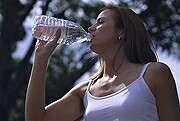Expert offers tips on how to exercise smartly, avoid heat stroke.
(HealthDay)—People who exercise or play sports outdoors during the summer need to take steps to avoid heat injury, especially heat stroke, an expert says.
"Not every case of heat stroke is fatal, but some cases are," Stacey Snelling, associate dean of American University's School of Education, Teaching and Health, said in a university news release. "Once you have experienced heat stroke, you need to be even more careful, as you are more susceptible to it because you have ruined your hypothalamus, the part of your brain that regulates body temperature."
She offered some tips for people who are physically active outdoors during the summer.
- Exercise during the coolest time of the day. "Many people think the evening is the coolest time of day, but actually, it is early in the morning just before the sun rises. If your schedule will not accommodate an early morning workout, wait until at least 5 p.m.," Snelling said.
- Choose the right type of clothing. "Clothing choice is important. Wear light colors as they reflect light, and items made from moisture-wicking material, not cotton, which absorbs sweat and feels heavy when saturated. Also, wear as little clothing as possible," Snelling recommended.
- Ease into outdoor summer activity. "Acclimatization is how our bodies gradually adjust to the heat. Take it slow the first couple of weeks, gradually increasing the intensity of your workout—but listen to your body. If you start feeling sick or dizzy, stop immediately to rest, cool down and hydrate," Snelling advised.
- Stay hydrated. "Drink water while you are active, but also, weigh yourself before you exercise outdoors, then again after you are done. Drink enough water to replace what you lost during your activity—one pint of water for every pound you lose," Snelling said.
- Use sunscreen. "Numerous brands make light-feeling and sweat-resistant sport sunblock formulas that won't run in your eyes," Snelling said. "If you have long hair, wear it up so that the sweat on your neck can better evaporate to keep you cool."
More information: The U.S. Centers for Disease Control and Prevention offers tips for preventing heat-related illness.
Health News Copyright © 2013 HealthDay. All rights reserved.




















